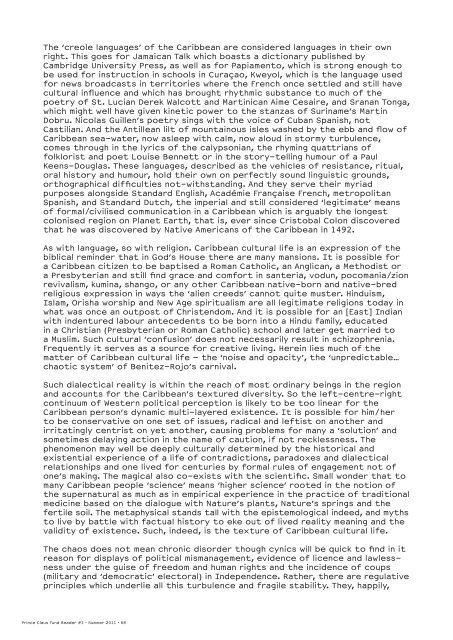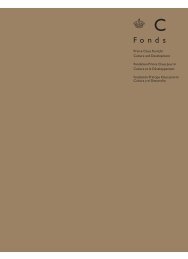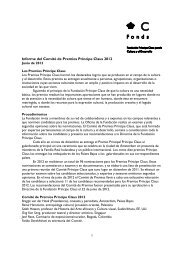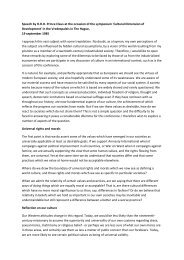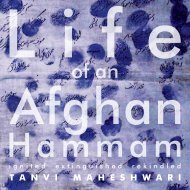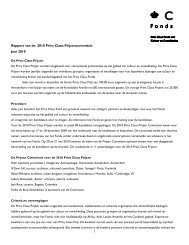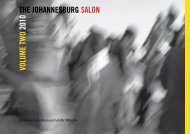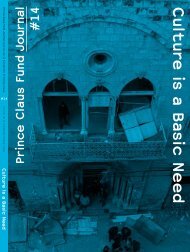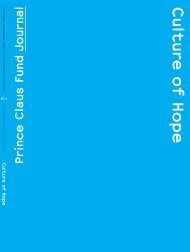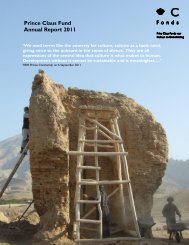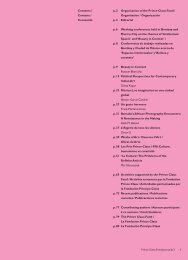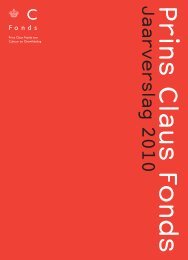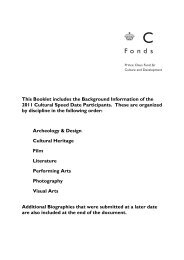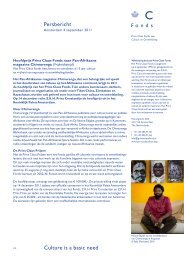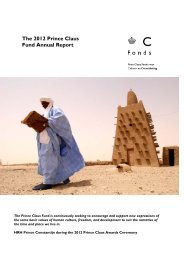3 summer 2011 - Prince Claus Fund
3 summer 2011 - Prince Claus Fund
3 summer 2011 - Prince Claus Fund
- No tags were found...
You also want an ePaper? Increase the reach of your titles
YUMPU automatically turns print PDFs into web optimized ePapers that Google loves.
The ‘creole languages’ of the Caribbean are considered languages in their ownright. This goes for Jamaican Talk which boasts a dictionary published byCambridge University Press, as well as for Papiamento, which is strong enough tobe used for instruction in schools in Curaçao, Kweyol, which is the language usedfor news broadcasts in territories where the French once settled and still havecultural influence and which has brought rhythmic substance to much of thepoetry of St. Lucian Derek Walcott and Martinican Aime Cesaire, and Sranan Tonga,which might well have given kinetic power to the stanzas of Suriname’s MartinDobru. Nicolas Guillen’s poetry sings with the voice of Cuban Spanish, notCastilian. And the Antillean lilt of mountainous isles washed by the ebb and flow ofCaribbean sea-water, now asleep with calm, now aloud in stormy turbulence,comes through in the lyrics of the calypsonian, the rhyming quattrians offolklorist and poet Louise Bennett or in the story-telling humour of a PaulKeens-Douglas. These languages, described as the vehicles of resistance, ritual,oral history and humour, hold their own on perfectly sound linguistic grounds,orthographical difficulties not-withstanding. And they serve their myriadpurposes alongside Standard English, Académie Française French, metropolitanSpanish, and Standard Dutch, the imperial and still considered ‘legitimate’ meansof formal/civilised communication in a Caribbean which is arguably the longestcolonised region on Planet Earth, that is, ever since Cristobal Colon discoveredthat he was discovered by Native Americans of the Caribbean in 1492.As with language, so with religion. Caribbean cultural life is an expression of thebiblical reminder that in God’s House there are many mansions. It is possible fora Caribbean citizen to be baptised a Roman Catholic, an Anglican, a Methodist ora Presbyterian and still find grace and comfort in santeria, vodun, pocomania/zionrevivalism, kumina, shango, or any other Caribbean native-born and native-bredreligious expression in ways the ‘alien creeds’ cannot quite muster. Hinduism,Islam, Orisha worship and New Age spiritualism are all legitimate religions today inwhat was once an outpost of Christendom. And it is possible for an [East] Indianwith indentured labour antecedents to be born into a Hindu family, educatedin a Christian (Presbyterian or Roman Catholic) school and later get married toa Muslim. Such cultural ‘confusion’ does not necessarily result in schizophrenia.Frequently it serves as a source for creative living. Herein lies much of thematter of Caribbean cultural life – the ‘noise and opacity’, the ‘unpredictable…chaotic system’ of Benitez-Rojo’s carnival.Such dialectical reality is within the reach of most ordinary beings in the regionand accounts for the Caribbean’s textured diversity. So the left-centre-rightcontinuum of Western political perception is likely to be too linear for theCaribbean person’s dynamic multi-layered existence. It is possible for him/herto be conservative on one set of issues, radical and leftist on another andirritatingly centrist on yet another, causing problems for many a ‘solution’ andsometimes delaying action in the name of caution, if not recklessness. Thephenomenon may well be deeply culturally determined by the historical andexistential experience of a life of contradictions, paradoxes and dialecticalrelationships and one lived for centuries by formal rules of engagement not ofone’s making. The magical also co-exists with the scientific. Small wonder that tomany Caribbean people ‘science’ means ‘higher science’ rooted in the notion ofthe supernatural as much as in empirical experience in the practice of traditionalmedicine based on the dialogue with Nature’s plants, Nature’s springs and thefertile soil. The metaphysical stands tall with the epistemological indeed, and mythsto live by battle with factual history to eke out of lived reality meaning and thevalidity of existence. Such, indeed, is the texture of Caribbean cultural life.The chaos does not mean chronic disorder though cynics will be quick to find in itreason for displays of political mismanagement, evidence of licence and lawlessnessunder the guise of freedom and human rights and the incidence of coups(military and ‘democratic’ electoral) in Independence. Rather, there are regulativeprinciples which underlie all this turbulence and fragile stability. They, happily,<strong>Prince</strong> <strong>Claus</strong> <strong>Fund</strong> Reader #1 · Summer <strong>2011</strong> · 68


